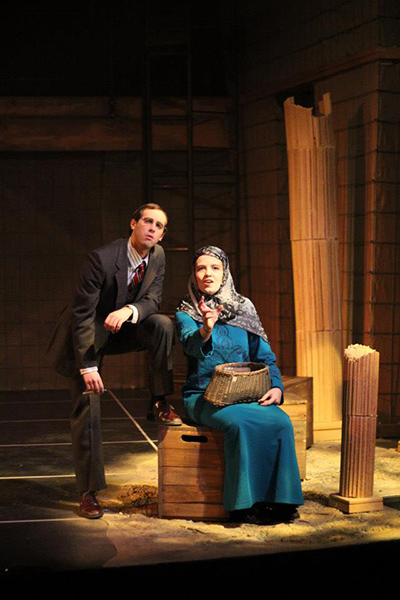
The New Paltz Theater Department will stray from tradition as they transport Shakespeare’s “Macbeth” from Scotland to the Middle East.
“Macbeth,” the second mainstage production of the fall semester, will run from Thursday, Nov. 29 to Sunday, Dec. 2 and Thursday, Dec. 6 to Sunday, Dec. 9 in McKenna Theatre.
Director Paul Kassel said he decided to set the play in “a present-day unnamed Eurasian country” after being given the opportunity to direct a “non-traditional version of ‘Macbeth.’” While constructing an original version of the play, Kassel said he sensed a “connection” between the play and its themes, and the real life events occurring in the Middle East.
The production’s setting and time period have been uprooted, but the language of the script will remain.
Although Shakespearean text may be difficult for some actors, fourth-year theater performance major Stefan Brundage said he has been preparing for the role of Macbeth for some time now.
“As soon as I found out we were doing ‘Macbeth,’ I wanted this part,” he said. “I did a month-long intensive Shakespeare boot camp over the summer with Shakespeare in Company. It made me vulnerable and really broke me down as an actor and a person.”
Brundage described Macbeth as “Shakespeare’s action figure,” and above all a soldier.
“I had to find the vulnerability of my character and learn to mask that vulnerability,” he said. “I had to learn to show no fear even if I was freaking out inside. I had to keep a grounded muscle while being scared to the point of hysteria.”
Standing beside Macbeth for a portion of the show is his wife, Lady Macbeth, who Brundage said is “one of the hottest women in literature.”
Played by third-year theater performance major Robin Epes, Lady Macbeth is a character who Epes said she was scared to immerse herself in. A complex character whom the text alludes to as having lost a child, Epes’ biggest challenge throughout the process has not been getting into character, but learning to get out of it.
“During the famous sleepwalking scene, I’m spilling my guts all over the stage and it’s hard not to let the grief and fear I feel during the scene consume me,” she said. “I’m scared of how much it affects me. When I got offstage, I took some time to cry and breathe and let myself know it’s okay to feel this. It’s going to be lingering there for a while.”
Acting as the driving force behind her husband’s actions for the majority of the play, Lady Macbeth slowly starts unraveling until she is nothing more than a shell, Epes said. Epes said her character is like a puzzle that has been put back together so many times it doesn’t fit anymore.
Although the cast is working with difficult material, they have all supported each other, according to third-year theater performance major Jenna-Kate Karn, who plays the Bloody Captain and Lady MacDuff. The cast has learned that the heaviness of the onstage material should fuel the lightness offstage, she said.
As far as altering the setting and time period of such a timeless production, Kassel said he is prepared for “purists” to quibble with his choices, but he stands by them.
“I know people aren’t going to like this, but I’m fine with that,” he said. “There are always going to be people who come to the show with the text in their laps ready to see a traditional version of ‘Macbeth,’ but I’m not directing for them. I’m directing for the people who came unwillingly and ended up glad they came. My motto throughout this whole process has been ‘no fear.’”

